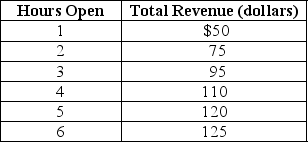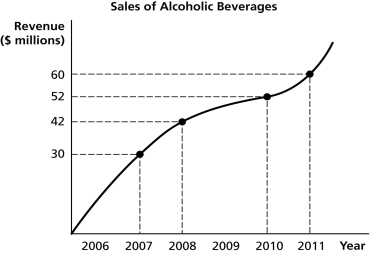Exam 1: Economics: Foundations and Models
Exam 1: Economics: Foundations and Models233 Questions
Exam 2: Trade-Offs, comparative Advantage, and the Market System259 Questions
Exam 3: Where Prices Come From: the Interaction of Demand and Supply242 Questions
Exam 4: Economic Efficiency, government Price Setting, and Taxes208 Questions
Exam 5: Externalities, environmental Policy, and Public Goods267 Questions
Exam 6: Elasticity: The Responsiveness of Demand and Supply295 Questions
Exam 7: The Economics of Health Care169 Questions
Exam 8: Firms, the Stock Market, and Corporate Governance278 Questions
Exam 9: Comparative Advantage and the Gains From International Trade189 Questions
Exam 10: Consumer Choice and Behavioral Economics302 Questions
Exam 11: Technology, production, and Costs330 Questions
Exam 12: Firms in Perfectly Competitive Markets298 Questions
Exam 13: Monopolistic Competition: the Competitive Model in a More Realistic Setting278 Questions
Exam 14: Oligopoly: Firms in Less Competitive Markets262 Questions
Exam 15: Monopoly and Antitrust Policy271 Questions
Exam 16: Pricing Strategy263 Questions
Exam 17: The Markets for Labor and Other Factors of Production286 Questions
Exam 18: Public Choice,taxes,and the Distribution of Income258 Questions
Select questions type
What is an entrepreneur,and what decisions does an entrepreneur make in a market system?
(Essay)
4.8/5  (45)
(45)
Which of the following are positive economic statements and which are normative economic statements?
a.An increase in the price of gasoline will decrease the quantity of gasoline purchased.
b.The government should eliminate the minimum wage.
c.All states should raise the minimum wage to at least $10 per hour.
d.The government should scrap its current income tax structure in favor of a flat tax.
e.Unemployment has increased since the onset of the recession.
f.The government should not bail out investment banks during a financial crisis.
(Essay)
4.8/5  (24)
(24)
The term "market" refers to trading arrangements by which buyers and sellers come together.
(True/False)
4.8/5  (46)
(46)
Optimal decisions are made at the point where marginal cost equals zero.
(True/False)
4.9/5  (38)
(38)
One example of human capital is the amount of skills that you have.
(True/False)
4.8/5  (40)
(40)
All of the following contributed to the downfall of the Soviet Union in 1991 except
(Multiple Choice)
4.8/5  (33)
(33)
Table 1-1
 Lydia runs a small nail salon in the town of New Hope. She is debating whether she should extend her hours of operation. Lydia figures that her sales revenue will depend on the number of hours the nail salon is open as shown in the table above. She would have to hire a worker for those hours at a wage rate of $10 per hour.
-Refer to Table 1-1.Using marginal analysis,how many hours should Lydia extend her nail salon's hours of operations?
Lydia runs a small nail salon in the town of New Hope. She is debating whether she should extend her hours of operation. Lydia figures that her sales revenue will depend on the number of hours the nail salon is open as shown in the table above. She would have to hire a worker for those hours at a wage rate of $10 per hour.
-Refer to Table 1-1.Using marginal analysis,how many hours should Lydia extend her nail salon's hours of operations?
(Multiple Choice)
4.9/5  (28)
(28)
Consider the following economic agents:
a.the government
b. consumers
c.producers
Who,in a centrally planned economy,decides what goods and services will be produced with the scarce resources available in that economy?
(Multiple Choice)
5.0/5  (30)
(30)
Where do economic agents such as individuals,firms and nations,interact with each other?
(Multiple Choice)
4.9/5  (37)
(37)
Trinh quits his $80,000-a-year job to become a full-time volunteer at a museum.What is the opportunity cost of his decision?
(Multiple Choice)
4.9/5  (36)
(36)
If the marginal cost of keeping a doctor's office open one additional hour per day is $200,then the doctor should keep the office open for one extra hour
(Multiple Choice)
4.9/5  (35)
(35)
All of the following is counted as "capital" in economics except
(Multiple Choice)
4.8/5  (28)
(28)
The highest valued alternative that must be given up to engage in an activity is the definition of
(Multiple Choice)
4.8/5  (42)
(42)
Figure 1-1  -Refer to Figure 1-1.Using the information in the figure above,calculate the percentage change in sales of alcoholic beverages between 2008 and 2011.
-Refer to Figure 1-1.Using the information in the figure above,calculate the percentage change in sales of alcoholic beverages between 2008 and 2011.
(Multiple Choice)
4.7/5  (41)
(41)
Voluntary exchange between buyers and sellers generates ________ in a market economy.
(Multiple Choice)
4.8/5  (37)
(37)
The Coffee Nook,a small cafe near campus,sells cappuccinos for $2.50 and Russian tea cakes for $1.00 each.What is the opportunity cost of buying a Russian tea cake?
(Multiple Choice)
4.8/5  (37)
(37)
Showing 181 - 200 of 233
Filters
- Essay(0)
- Multiple Choice(0)
- Short Answer(0)
- True False(0)
- Matching(0)